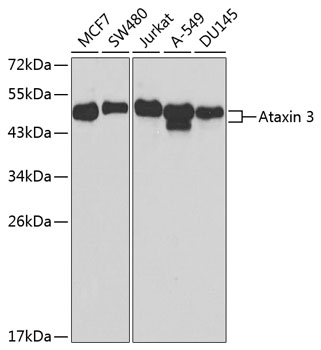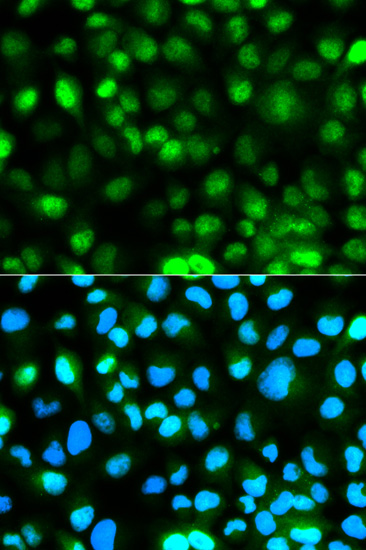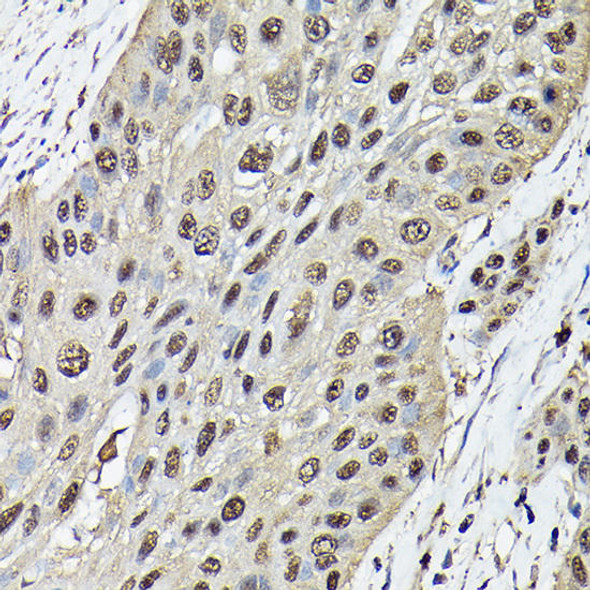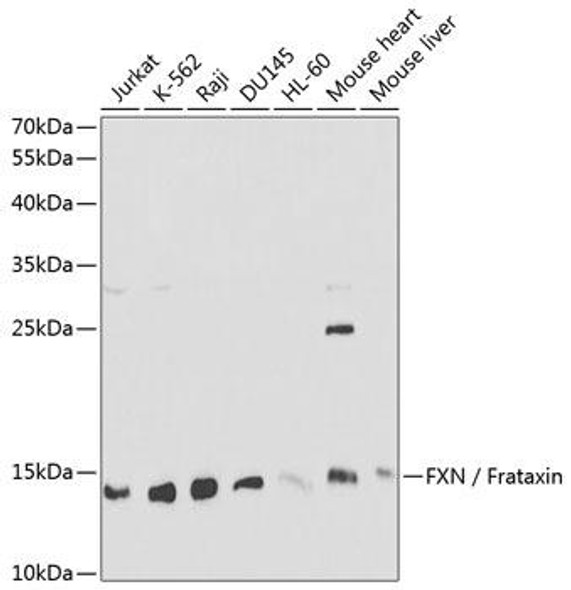Epigenetics & Nuclear Signaling Antibodies 1
Anti-Ataxin 3 Antibody (CAB12992)
- SKU:
- CAB12992
- Product Type:
- Antibody
- Reactivity:
- Human
- Reactivity:
- Mouse
- Host Species:
- Rabbit
- Isotype:
- IgG
- Antibody Type:
- Polyclonal Antibody
- Research Area:
- Epigenetics and Nuclear Signaling
Description
| Antibody Name: | Anti-Ataxin 3 Antibody |
| Antibody SKU: | CAB12992 |
| Antibody Size: | 20uL, 50uL, 100uL |
| Application: | WB IF |
| Reactivity: | Human, Mouse |
| Host Species: | Rabbit |
| Immunogen: | Recombinant fusion protein containing a sequence corresponding to amino acids 1-364 of human Ataxin 3 (NP_004984.2). |
| Application: | WB IF |
| Recommended Dilution: | WB 1:500 - 1:2000 IF 1:50 - 1:200 |
| Reactivity: | Human, Mouse |
| Positive Samples: | MCF7, SW480, Jurkat, A-549, DU145, Mouse brain, Mouse liver |
| Immunogen: | Recombinant fusion protein containing a sequence corresponding to amino acids 1-364 of human Ataxin 3 (NP_004984.2). |
| Purification Method: | Affinity purification |
| Storage Buffer: | Store at -20'C. Avoid freeze / thaw cycles. Buffer: PBS with 0.02% sodium azide, 50% glycerol, pH7.3. |
| Isotype: | IgG |
| Sequence: | MESI FHEK QEGS LCAQ HCLN NLLQ GEYF SPVE LSSI AHQL DEEE RMRM AEGG VTSE DYRT FLQQ PSGN MDDS GFFS IQVI SNAL KVWG LELI LFNS PEYQ RLRI DPIN ERSF ICNY KEHW FTVR KLGK QWFN LNSL LTGP ELIS DTYL ALFL AQLQ QEGY SIFV VKGD LPDC EADQ LLQM IRVQ QMHR PKLI GEEL AQLK EQRV HKTD LERV LEAN DGSG MLDE DEED LQRA LALS RQEI DMED EEAD LRRA IQLS MQGS SRNI SQDM TQTS GTNL TSEE LRKR REAY FEKQ QQKQ QQQQ QQQQ QGDL SGQS SHPC ERPA TSSG ALGS DLGD AMSE EDML QAAV TMSL ETVR NDLK TEGK K |
| Gene ID: | 4287 |
| Uniprot: | P54252 |
| Cellular Location: | Nucleus matrix |
| Calculated MW: | 20kDa/35kDa/39kDa/41kDa |
| Observed MW: | 50kDa |
| Synonyms: | ATXN3, AT3, ATX3, JOS, MJD, MJD1, SCA3, ataxin-3, Ataxin 3 |
| Background: | Machado-Joseph disease, also known as spinocerebellar ataxia-3, is an autosomal dominant neurologic disorder. The protein encoded by this gene contains (CAG)n repeats in the coding region, and the expansion of these repeats from the normal 12-44 to 52-86 is one cause of Machado-Joseph disease. There is a negative correlation between the age of onset and CAG repeat numbers. Alternatively spliced transcript variants encoding different isoforms have been described for this gene. |
| UniProt Protein Function: | ataxin-3: Deubiquitinating enzyme involved in protein homeostasis maintenance, transcription, cytoskeleton regulation, myogenesis and degradation of misfolded chaperone substrates. Binds long polyubiquitin chains and trims them, while it has weak or no activity against chains of 4 or less ubiquitins. Involved in degradation of misfolded chaperone substrates via its interaction with STUB1/CHIP: recruited to monoubiquitinated STUB1/CHIP, and restricts the length of ubiquitin chain attached to STUB1/CHIP substrates and preventing further chain extension. In response to misfolded substrate ubiquitination, mediates deubiquitination of monoubiquitinated STUB1/CHIP. Interacts with key regulators of transcription and represses transcription: acts as a histone- binding protein that regulates transcription. Defects in ATXN3 are the cause of spinocerebellar ataxia type 3 (SCA3); also known as Machado-Joseph disease (MJD). Spinocerebellar ataxia is a clinically and genetically heterogeneous group of cerebellar disorders. Patients show progressive incoordination of gait and often poor coordination of hands, speech and eye movements, due to degeneration of the cerebellum with variable involvement of the brainstem and spinal cord. SCA3 belongs to the autosomal dominant cerebellar ataxias type I (ADCA I) which are characterized by cerebellar ataxia in combination with additional clinical features like optic atrophy, ophthalmoplegia, bulbar and extrapyramidal signs, peripheral neuropathy and dementia. The molecular defect in SCA3 is the a CAG repeat expansion in ATXN3 coding region. Longer expansions result in earlier onset and more severe clinical manifestations of the disease. 3 isoforms of the human protein are produced by alternative splicing. |
| UniProt Protein Details: | Protein type:DNA repair, damage; Transcription regulation; EC 3.4.19.12; Ubiquitin-specific protease; Protease Chromosomal Location of Human Ortholog: 14q21 Cellular Component: nucleoplasm; nuclear matrix; mitochondrial matrix; mitochondrial membrane; cytoplasm; nucleus; cytosol; nuclear inclusion body Molecular Function:identical protein binding; protein binding; omega peptidase activity; ubiquitin protein ligase binding; ubiquitin-specific protease activity; ATPase binding Biological Process: ubiquitin-dependent protein catabolic process; proteasomal ubiquitin-dependent protein catabolic process; nervous system development; synaptic transmission; transcription, DNA-dependent; regulation of transcription, DNA-dependent; nucleotide-excision repair; misfolded or incompletely synthesized protein catabolic process; intermediate filament cytoskeleton organization and biogenesis; microtubule cytoskeleton organization and biogenesis; actin cytoskeleton organization and biogenesis Disease: Machado-joseph Disease |
| UniProt Code: | P54252 |
| NCBI GenInfo Identifier: | 290457685 |
| NCBI Gene ID: | |
| NCBI Accession: | P54252.4 |
| Molecular Weight: | |
| NCBI Full Name: | Ataxin-3 |
| UniProt Protein Name: | Ataxin-3 |
| UniProt Synonym Protein Names: | Machado-Joseph disease protein 1; Spinocerebellar ataxia type 3 protein |
| Protein Family: | Histone-lysine N-methyltransferase |
| UniProt Gene Name: | ATXN3 |
| UniProt Entry Name: | ATX3_HUMAN |








